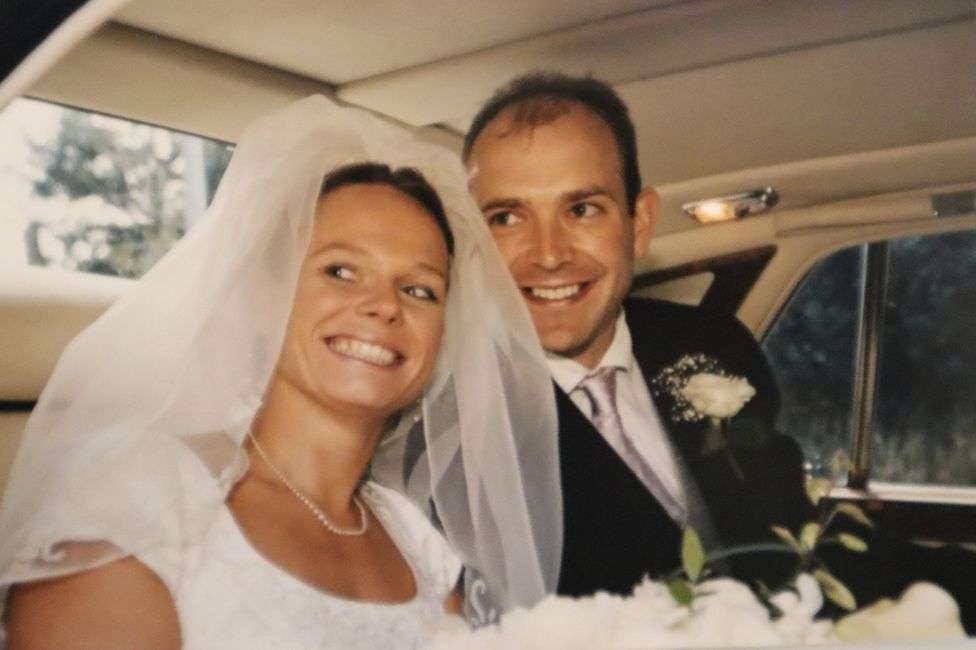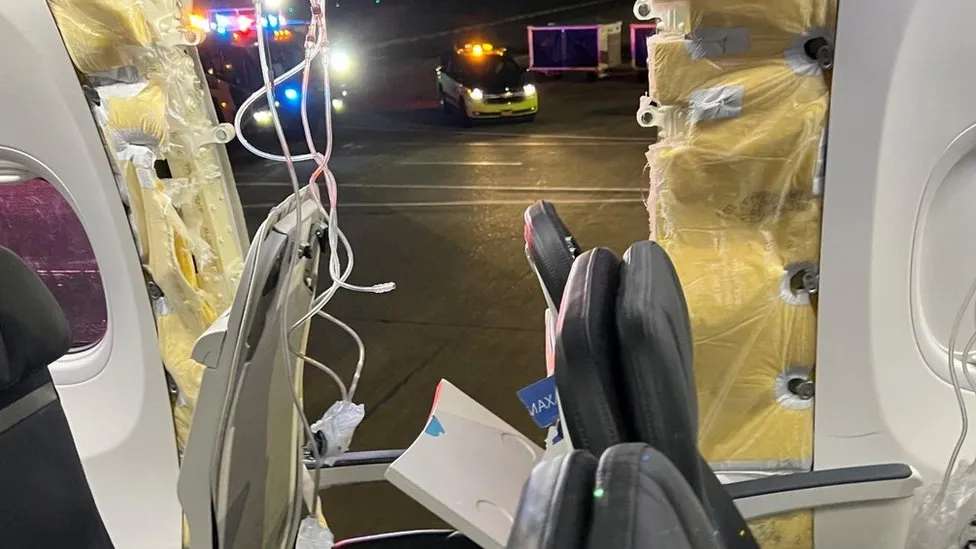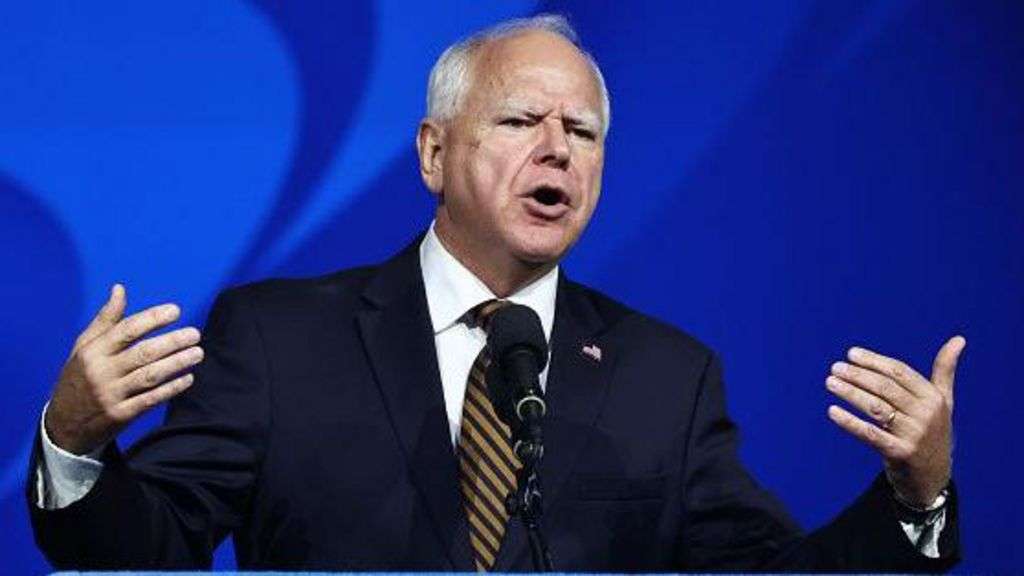Families of British rugby players murdered in the 2002 Bali terror attack have been in Guantanamo Bay to watch the sentencing of two men who conspired to kill them. Their trip is a milestone in their long struggle for justice for their loved-ones. Because of a plea deal, the accused will serve six years.
Dan Miller, 31, had been married for just five weeks when he arrived with his wife Polly on the Indonesian island of Bali - the same place they had met two years earlier.
Polly says she first noticed Dan's "lively, dancey" eyes in 2000. The following year he proposed on the island and in 2002 they were back. It was "our place" she says.
But 12 October 2002 was an anniversary al-Qaeda planned to mark - it was one year, one month and one day after the 9/11 attacks on the United States.
Dan, a lawyer living in Hong Kong, played for an expat rugby team nicknamed the Vandals who were on tour, as they had been in previous years, in Bali. That night they went to a local hang-out called the Sari Club.
Polly's last memory of her husband is of him at the bar asking if she wanted a cocktail as she headed to the dance floor.
Suddenly, the Cher song the DJ was playing was interrupted by a loud bang at a nearby venue - Paddy's Bar. Then there was another, much louder bang inside the Sari Club.
Polly compares the enormous explosion to being in a movie, "a yellow swirl of light… then being flipped into the air and somersaulted around".
Something lay on top of her and she realised her legs were burning. "Oh my God, I'm going to die," she thought.
People were screaming and there were flames everywhere. Polly managed to pull off part of the corrugated iron roof which had landed on her body and scramble outside.
Eventually, with burns over nearly half of her body, she made it to hospital. It would be 10 days until Polly was officially told that Dan was one of the fatalities.
In the two bombings, 202 people were killed - including 28 Britons. Eleven people linked to the touring Vandals rugby club were among the dead.
Since then, a group of bereaved families from the Vandals and another expat rugby club have fought a 21-year battle for answers and some form of justice.
"They were all great friends," Dan's older sister, Susanna Miller, tells the OceanNewsUK. "Now we are all old friends… it's a natural extension of those teams."
It has been a long road - with years of delays - which led the British families to the special military courtroom at the US military base in Guantanamo Bay.
There, they were able to read victim impact statements - a first at the court on the island of Cuba.
In the months after the 9/11 attacks in 2001, the US began to send detainees to the base. It was chosen since it operated outside of normal US territory and established legal processes. Military commissions, overseen by a military judge, were created to put some of the detainees on trial.
Despite hundreds of men having been held at Guantanamo, there have been only four convictions - all guilty pleas - that have survived appeals, according to the American Bar Association, which represents US lawyers.
The convictions of Mohammed Bin Lep and Mohammed Bin Amin can now be added to that total. The two Malaysians admitted conspiring to carry out the Bali bombings by the group Jemaah Islamiyah, an affiliate of al-Qaeda.
Susanna Miller says the wait has been very difficult. "Without the trials, you are frozen. That stage of grief can't move until you have the justice seen to be done."
The lengthy delays have partly been caused by the legal fallout from the use of controversial interrogation methods at a secret network of CIA prisons. The two Malaysian men have both claimed they were tortured.
But the British families say too much focus on the mistreatment of suspects risks becoming a distraction.
"It has to be about the Bali victims," says Susanna. "Of course, torture is never acceptable and being held without charge or trial is never acceptable, but I don't want it to cloud the true focus - which should be on the victims."
She explains that despite the controversy surrounding the base, this is still an important moment.
"It's not perfect, but it's all we've got."
Maggie Stephens lost her son 27-year-old Neil Bowler in the Bali bombings. He had been living in Singapore, working as a conference organiser for The Economist magazine.
Like Susanna, she travelled to Cuba to deliver her victim impact statement. She says she was in tears while she wrote it, "but that, in itself, is quite cathartic".
In her statement, Maggie described Neil, who was on the rugby trip, as "compassionate" with a "terrific zest for life".
"The only consolation I and his family have is that Neil knew nothing about what happened - standing in a bar, having played rugby - and then having a few drinks," she writes.
Matthew Arnold is in Guantanamo for his older brother Tim. "He exuded this quiet confidence," he says. "He was a very charming and charismatic man, but in a quiet and restrained way."
Tim was a successful solicitor - following in the footsteps of his father, who "died a broken man", says Matthew.
His family has an "unbreakable association with, and respect for, the law", he says. It is in that spirit that Matthew says he is seeking justice for his brother, who was "removed from this world in the most barbaric way".
The visit to Guantanamo has proved gruelling for the families. The legal process has been confusing and uncertain.
At one point this week, the military judge seemed to suggest the victim statements could not be read out.
He eventually relented, but then ruled that those attending could only read their statements and not make any on behalf of family members left at home.
Relatives in attendance then scrambled to try to incorporate the others' feelings into their own readings, before there was yet another change.
Defendants' lawyers offered to allow the other statements to be read out during their defence.
Susanna Miller's son, Solomon, 18, carried with him a statement from Dan's mother, Felicity, who is in her 80s and unable to make the long journey.
Felicity told the BBC her words offered a chance to convey feelings she often struggled to express.
"I spend my life now not trying to expose my feelings about the crime that was committed, and the awful loss of my son, because it's actually too painful for me," she explained.
The families sat in a special part of the court watching proceedings through a glass screen with a 40-second audio delay, because of the risk of classified information being revealed.
But while reading the victim statements they were allowed to stand in court and address the two men directly.
"I couldn't bear the thought that somebody is standing trial for [Dan's] murder and for his relatives not to be there to say it mattered. It mattered terribly," Susanna says.
She hopes the hearings will have helped expose the role of al-Qaeda in the 2002 attack.
"It has always been the single most important thing to try and get to the bottom of how Bali happened."
On Friday, the jury, drawn from military officers, sentenced the two men to 23 years - but, as a result of the plea deal, they will only serve six years in detention.
Others linked to the Bali attack have previously been convicted and jailed at trials in Indonesia.
Military prosecutors now hope to use testimony from Bin Lep, 47 and Bin Amin, 48 in the trial of the alleged plot ringleader, known as Hambali, who like his co-conspirators has been held at Guantanamo since 2006. His military trial could start next year, although further delays seem likely.
Matthew Arnold, who lost his brother Tim, was braced for reduced sentences because of Bin Amin and Bin Lep's plea deal. But if that means Hambali is found guilty "and meets his just rewards", he says, then perhaps it is a price worth paying. "He was the brains behind it."
Dan Miller's widow, Polly, who now has four teenage children from a subsequent marriage, was not able to travel out. But she hopes to attend the trial of Hambali.
She says it is exhausting living with the grief, but "it's important for me that they are not loose to do it again".
Polly, along with Dan's mother Felicity, set up a charity to help burns survivors which has raised £3m. She continues to receive treatment for her burns.
"You can tick the box that justice has been served," she says. "But it doesn't bring them back. They were robbed of their future, no matter what we do."
Susanna was a driving force behind the impressive London memorial to the Bali bombings victims which sits by the Foreign Office.
"You do have to see it through… and it only feels right as Dan's big sister to do that," she says.








